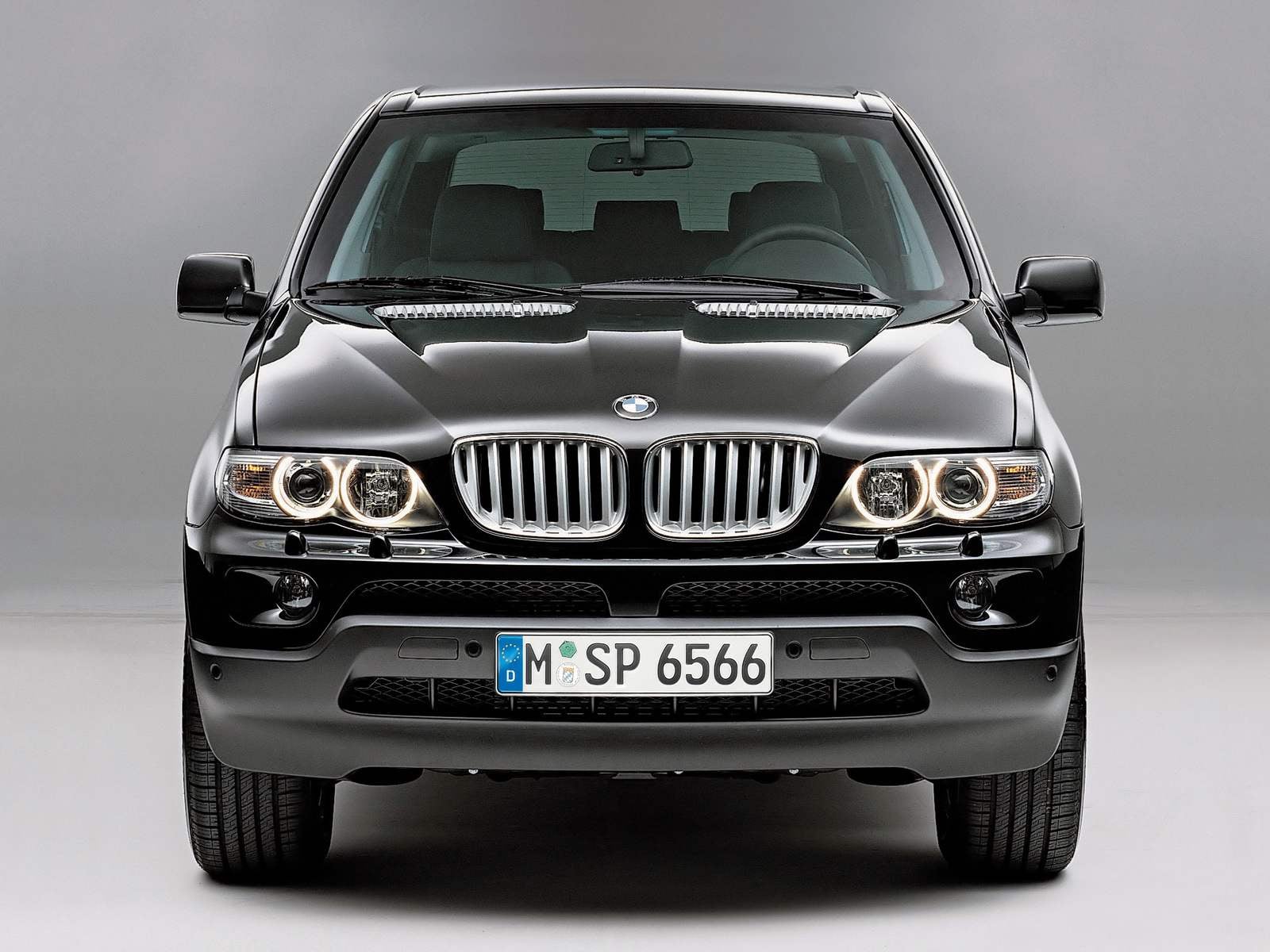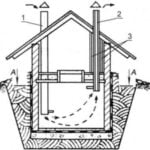 All-wheel-drive BMW X5. In recent decades, the popularity of SUVs-SUVs are steadily growing — today, these machines are bought not only by those who do not enjoy the roads and “ways” but those who never in life was “blessed” by the wheels of your car touching the primer. The reason for the popularity of SUVs, not only in their vehicles (car enthusiasts willing to buy and jeep”SUV”), but in the full image of the car — reliable, powerful, fast, maneuverable and safe.
All-wheel-drive BMW X5. In recent decades, the popularity of SUVs-SUVs are steadily growing — today, these machines are bought not only by those who do not enjoy the roads and “ways” but those who never in life was “blessed” by the wheels of your car touching the primer. The reason for the popularity of SUVs, not only in their vehicles (car enthusiasts willing to buy and jeep”SUV”), but in the full image of the car — reliable, powerful, fast, maneuverable and safe.
Comfortable passenger SUVs, the ancestor of which is not without reason to believe was created about 30 years ago Volzhsky automobile frameless all-wheel-drive jeep VAZ-2121 “NIVA”, today produce almost all well-known automobile firms. However, until recently there were exceptions to this list: the number of manufacturers comfortable jeeps only recently joined the firm Volkswagen (VW TUAREG SUV), Volvo (VOLVO XC90), and finally the famous BMW created only recently two full passenger SUV — the BMW X5 and BMW X3.
The first in the history of the company Bayerische Motoren Werke BMW X5 SUV was unveiled at the 1999 Detroit auto show. Jeep has made a real sensation in the automotive world the fact that the company managed very well to bring it hard-matched to create a four-wheel drive with high body and high ground clearance, easily coping with secondary roads, and at the same time, with increased comfort and a pronounced sporty character.
BMW X5 manufactured exclusively in the BMW plant in Spartanburg (South Carolina, USA), which holds the record for the fastest automobile in the world run the machines. Since 1999, with the conveyor of the plant went down more than half a million cars — first BMW 3-series, then series, Z3, X5 and Z4.
Currently, the production area about 420 hectares and employs over 4,700 people. This is the plant with the highest degree of automation in the world, which uses modern technology under the scheme “just in time” (just-in-time) and more than 100 robots are welding, transportation, and quality assurance Components come from local suppliers at the moment and the place when and where they are needed. The work is conducted in groups that accompany the car throughout the production process and perform all the necessary operations before the machine will be in the area of responsibility of another group.

All-wheel drive BMW X5
Now more about the new BMW X5 is equipped with brand new intelligent all-wheel drive system, dubbed xDrive.
The principle of operation of xDrive is based on the fact that torque is redistributed between the front and rear wheels, and higher torque is instantly routed to where most needed. But this does not mean that xDrive reacts only to the fact has already happened. The system has a kind of “mind”, which is using the DSC sensors monitors the traffic situation, preventing loss of traction at the very beginning of its occurrence.
The xDrive system has two main components — a Central multi-plate clutch with electronic control, which distributes torque between the axles, and the well-known stabilization system DSC, which governs efforts directed at individual wheels. The system operates continuously variable, and the DSC sensors constantly monitor the rotation speed of each wheel, steering angle, lateral acceleration and yaw rate, thus providing the system xDrive all necessary information. In extreme situations, when the wheel slip is inevitable, DSC helps xDrive, acting on the individual wheels, reducing engine power and Cycling, if necessary, brakes.

Geometric diagram BMW X5

Suspension BMW X5

Graphs of power and torque of the engine of BMW X5 4,8 is

Interior of BMW X5
In off-road conditions, on uneven or slippery road xDrive reacting within milliseconds, redirecting torque from slipping wheels to those that have the best traction. In normal driving conditions the multi-plate clutch can transfer torque from 100 percent to the rear wheels (clutch fully open) before switching to the front (clutch fully closed) of Course, any intermediate position, including the equal distribution of torque between axles in the ratio 50:50.
The reaction time of the xDrive system is only 0.1 s. If the vehicle threatens to skid, xDrive closes the multiple disc clutch, increasing the torque directed to front wheels, and “pulling” the car out of the turn. Similarly, if the vehicle threatens demolition of the front wheels, xDrive reduces the time allocated to them.
Designed for car clutches with electronic control, electro-hydraulic and not (as some competitors) was due to the fact that electronics ensures instant transfer of torque in all situations, and the electro-hydraulic system need some time.
During the movement of the clutch allows to send to front or rear wheels the required time or to completely remove it, if circumstances so require. Under heavy acceleration and no slipping clutch distributes torque in the ratio of 50:50 and maximum traction. And in the steady motion it provides fade-free distribution of torque between front and rear wheels.
The new BMW X5 is equipped with engines that features increased power, torque, elasticity, as well as lower fuel consumption and emissions than its predecessors. We are talking about three new engines — 6-cylinder diesel engine 3.0 i the second generation, the V8 4.4 i and 4.8 is high performance.
Powerful 6-cylinder 3.0 i continues to exist, but can be equipped with a six-speed manual transmission and, of course, xDrive as standard.
The previous 3-litre diesel with Common Rail injection system debuted in the BMW 5-series, and then was installed and BMW X5. When the working volume 2993 cm3 this diesel developing 218 HP, maximum torque is 500 Nm between 2000 and 2750 rpm! Such characteristics of the motor provide a high sensitivity of the engine at low revs, smoother acceleration and uniform power set. Car with this engine can accelerate from standstill to 100 km/h in 8.3 s and a top speed of 210 km/h. However, these indicators do not go to the detriment of efficiency as the fuel consumption of the new X5 3.0 d is only 8.6 l/100 km.
These impressive figures are achieved thanks to the Common Rail injection system of the second generation that feeds into the injector fuel under constant high pressure of 1600 bar. Spraying it through nozzles with tiny holes more efficiently, it contributes to better combustion and thereby improving engine performance. The fuel is injected into the combustion chamber up to four times per clock: double pilot injection, main and extension. First make the combustion process more uniform, and the secondary injection helps to reduce oxidation of the particles and the toxicity of exhaust gases. In this case, the high-pressure pump requires less energy, and in the system there is little unburned fuel that makes a significant contribution to improving vehicle efficiency.
The diesel engine drives the new digital system (DDE5), by which he works all the time in perfect working conditions, defined as more than 6000 control points. DDE5 also controls the process of combustion, by controlling the operation of the system quick heat glow plugs that allows you without delay to start the engine at low temperatures and using less energy. Engine BMW X5 3.0 d lets you instantly launch up to temperatures of plus five degrees Celsius, and in just two seconds is required for warming up of candles at a temperature of minus 20 degrees.

The front of the cabin of the BMW X5
With the rear seats folded the Luggage compartment of the BMW X5 is more than 1.5 m3!
Model for sports-active car performance the new BMW X5 has allowed to equip it with a modified version of the petrol engine V8 4.4 i with VALVETRONIC. The engine displacement of 4398 cm3 and a power of 320 HP at 6100 rpm capable of accelerating the car from standstill to 100 km/h in 7.0 seconds. On the highway the BMW X5 has a top speed of 240 km/h. Torque of 440 Nm at 3700 rpm. When driving in the combined cycle fuel consumption is 13.1 l/100 km.
Along with the VALVETRONIC system, adjusting valve stroke, the engine has an intake system with a continuously adjustable length intake tract and known still models system with the smooth regulation of the valve timing double VANOS.
The VALVETRONIC system, developed and patented by BMW, has allowed to abandon the traditional throttle. Thanks to this system the intake valves are raised exactly to the extent necessary to provide instant engine response, regardless of the dynamics of pressing of the driver’s foot on the gas pedal.
Double VANOS, which is a double system of variable valve timing improves the torque characteristics, changing the position of the camshafts intake and exhaust valves depending on the rotational speed of the crankshaft of the engine and throttle position. This system provides improved smoothness of engine operation at idle and excellent fuel efficiency. The system monitors the return of hot exhaust gases into the combustion chamber after the engine is started. At the time of warming up the engine VANOS improves toplivoobespechenie mixture and helps as soon as possible to increase the temperature of the catalytic gashanatantra and bring it to normal operating level.
BMW X5 is equipped with an adjustable intake system that can continuously change the length of the intake tract, adapting it to the requirements of the engine at the moment that contributes to the achievement of the optimum characteristics of power and torque throughout the Rev range.
The first BMW X5 was equipped with a powerful 6 cylinder 3 litre petrol engines, combining power, sensitivity reactions and cost-effectiveness. This same motor works great on BMW X5 2005 — he develops the power of 231 HP at 5900 rpm and propels the car to 100 km/h in 8.3 seconds. At 3500 rpm the torque on the shaft of the engine is 300 Nm, while fuel consumption in the combined cycle does not exceed 12.7 l/100 km; Four valves per cylinder, adaptive anti-knock control and separate coils of ignition for each cylinder of the engine combined with the dual VANOS motor and provide the highest level of performance. The management of these innovations is provided by Siemens MS43 system, which monitors all engine functions, including the operation of the electronic throttle. Throttle-by-wire allows you to instantly implement the driver’s commands. The system determines which gear is engaged and activates individually for each programmed control algorithm for the throttle.
In-line 6-cylinder engine models 3.0 i and 3.0 d equipped with the six-speed manual transmission, and a V-shaped 8-cylinder 4.4 i is aggregated with a 6-speed automatic transmission (a / t). The heart of the new ultra-compact automatic transmission ZF GA6HP26Z is a planetary scheme Lepelletier that exceeds the most common, but more cumbersome scheme of Wilson. Electro-hydraulic unit has three driving modes, each of which is selected by the selector lever — Drive, Sport and Manual. In sport mode (Sport) the gears are shifted at higher revs, a sixth gear is not used. In manual mode (Manual) shift performed by the shift lever back (for switches “up”) or forward (switching down).

New 6-speed transmission has a wider gear range. Accordingly, the difference between the gear ratios of adjacent gears is smaller. First gear has a lower gear ratio than the five-speed box, allowing the BMW X5 to move with great acceleration. Well, the fifth and sixth Overdrive to help the engine reduce the engine speed in quiet rides and thereby reduce fuel consumption and noise levels.
The intelligent automatic is able to recognize the individual driving style of the driver, aligning with it shifting “up” and “down”. New 6-speed automatic gearbox is a refined version of the adaptive adjustment of the system, which in particular does not allow switching “up”, for example, increasing gas in a turn or descent from the mountain. Additionally ensures smoother gear shifts and improved fuel economy.
High quality and reliable steering of the BMW X5, its balance and stability are the envy of the owners of not only four wheel drive vehicles-SUVs, but sedans and classic. Machine behaves well off-road due to the large ground clearance, the range of suspension movement and excellent traction, which is provided by xDrive.
As you know, the requirements for asphalt car and the SUV are rather contradictory. Unlike many AWD vehicles frame construction, the BMW X5 has a bearing body with exceptional torsional stiffness — 23 100 Nm/deg. This allows you to absorb vibration from the road, vibrations of the suspension, engine and transmission, causing the driver and passengers feel like in a cocoon. This rigid design in combination with the wide track, large wheel base, weight distribution in the ratio 50:50, a relatively low center of gravity and, of course, the new xDrive system enables the BMW X5 to have everything for the brilliant handling.
Suspension borrowed from the current BMW 7-series, while the rear suspension uses aluminum components to reduce unsprung mass and a pneumatic system with electronic control for automatic adjustment of the height of the body above the road. Use in the control system rack and pinion mechanism allowed to reduce the turn radius of the vehicle up to 6 m and more informative steering.
In the BMW X5 rear suspension instead of conventional steel springs uses the gas strut, which are supplied with compressed air from the compressor with the electric drive. Having the function of automatic control of the height of the body above the road, the air suspension offers two key benefits. First, it ensures a constant vehicle height and ground clearance regardless of load. And secondly, due to the load capacity of the gas strut to provide the necessary driving comfort.
This system is controlled by two sensors, which measure the deviation of the two pendulum arms on the rear suspension and thereby determine the body height and ground clearance. As soon as the load on the rear suspension will increase the pressure in the gas strut to increase, and they automatically become more rigid.
Depreciation are provided in a separate gas-filled shock absorbers installed under the floor, allowing you to increase the space in the trunk between the wheel arches. The system automatically detects uneven loading and change of weight distribution during movement taking into account the actual conditions. For example, turn the on-Board computer determines the time when the self-adjusting suspension can cause unnecessary body roll, and instantly disables the monitoring function.
Brakes on the BMW X5 disc at both the front and rear wheels. Front — ventilated discs with a diameter of 332 mm, rear — non ventilated diameter 324 mm. Device brake force distribution, which is a standard part of the braking system provides maximum braking performance in emergency situations. ABS is an element of the base set.
System of providing active and passive safety the new BMW X5 provides the driver and passengers a level of protection, which no other class cars 4×4. In addition to front airbags for driver and front passenger, as well as pillows in the front doors of the new BMW X5 is in a base complete set front and rear airbags for head protection, which prevents the ball with his head or shoulder against the door in the event of a collision. Staying inflated long enough, they retain their protective effect in the case of the car overturning.
The pillows in the rear doors are offered as optional equipment. In total, the new BMW X5 can accommodate up to 10 airbags. A unique level of protection was recently confirmed by the five stars Euro NCAP test — the highest of all possible levels of safety.
The car is equipped with HDC, which allows drivers to safely and securely descend from the slopes. At speeds less than 50 km/h button in the middle of the Central console includes the HDC, which will limit the speed in the range from 5 to 25 km/h the speed Selection is made using buttons on the multifunction steering wheel or by pressing the accelerator. The driver does not have to manipulate the pedals “gas” or brake — automatic equipment itself controls the speed of the vehicle, individually braking individual wheels, providing the movement down the slope at a safe constant speed.
BMW the first in the world have created a system of control of stability of motion, which offers a significant increase in the level of security, especially on high speed roads. When driving with a trailer system aktiviziruyutsya and uses the DSC sensors to control the wagging of the trailer. At speeds over 65 km/h for any unwanted wobble of the trailer brakes are utilized on all wheels of the vehicle are lit brake lights and reduced engine power, allowing for a few seconds to stabilize the movement.
Specifications all-wheel drive car BMW X5

As additional equipment the creators of the BMW X5 offer adaptive headlights that use the speed information, the steering angle and the yaw rate of the vehicle to determine the angle of its rotation relative to the machine axis (maximum angle is 15 degrees). Improving road illumination by 90 percent, adaptive headlights contribute to a significant increase in the level of traffic safety.
Since the release of the X5 on the Russian market the number of sales of these cars is constantly growing. So, in 2002 in Russia was sold 699 cars, and worldwide total sales exceeded 100 thousand.
I. EVSTRATOV



